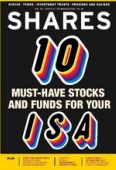Archived article
Please note that tax, investment, pension and ISA rules can change and the information and any views contained in this article may now be inaccurate.
The easy way to back online shopping stocks

Investors looking to play the e-commerce theme have a new option available to them thanks to the launch of a specialist exchange-traded fund – Global Online Retail ETF (IBUY).
The ETF tracks the EQM Global Online Retail Growth Index and aims to provide exposure to ‘the rapidly growing online e-commerce market as competitive pricing, shopping convenience, greater product selection and rapid delivery have made online shopping a disruptive technology that continues to exhibit strong growth characteristics, gain market share, and expand globally’.
It’s worth noting that the growth index underlying the ETF has two strict criteria – constituents must make at least 60% of their revenue online, which can include online marketplaces, and they have to meet a certain growth rate in terms of year-on-year sales for a number of quarters.
What this means is that as well as household names such as Amazon.com, ASOS (ASC:AIM), eBay and Netflix, the 47 constituents include a whole slew of lesser-known stocks such as 1-800-Flowers, Fiverr, Overstock.com, Showroomprivé and Verkkokauppa.com. More than 50% of the index is accounted for by the US.
It’s also worth bearing in mind that while online retail may have had a fantastic 2020 in terms of sales momentum, so far this year in share price terms at least the returns haven’t been so good as growth has given way to value in fund managers’ allocation decisions.

VOLATILITY AND COST
The EQM Online Retail Growth index was launched on 17 February 2020, and in a month it has fallen nearly 15%, suggesting this may be quite a volatile product.
There is no doubt that e-commerce has come on in leaps and bounds thanks to the pandemic – retailers talk about their businesses going through five years of change in five weeks at the outset – and there is also no doubt that some habits formed by shoppers during lockdown will stick.
However, it’s also true that being a successful internet retailer means investing huge amounts in technology, first in order to win customers and then in order to keep them.
By focusing on firms that are growing their sales, the index – and by extension the ETF – should at least avoid owning the stocks which lose out in the scramble for market share.
The index will be weighted by revenue, with a maximum allocation of 25% to emerging markets.
The ETF itself, which is eligible for SIPPs and ISAs, is relatively expensive with an ongoing charge of 0.69%, in part reflecting its greater complexity compared with a product like iShares Core FTSE 100 (ISF) which has an ongoing charge of just 0.07%.
Important information:
These articles are provided by Shares magazine which is published by AJ Bell Media, a part of AJ Bell. Shares is not written by AJ Bell.
Shares is provided for your general information and use and is not a personal recommendation to invest. It is not intended to be relied upon by you in making or not making any investment decisions. The investments referred to in these articles will not be suitable for all investors. If in doubt please seek appropriate independent financial advice.
Investors acting on the information in these articles do so at their own risk and AJ Bell Media and its staff do not accept liability for losses suffered by investors as a result of their investment decisions.

 magazine
magazine








